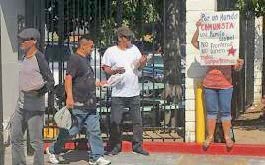
How Will a Communist World Without Money Feed the Masses?
How can we mobilize for a communist world without money? This article describes the process of a Party collective of workers. They do mass work (distributing Red Flag at a garment factory). They listen to workers’ questions and discuss, in their collective, how best to respond. They make plans to grow. When we invite readers to join the ICWP, this is what we are asking you to do!
This article also begins a discussion of how communism will organize food production. But it is too general. We ask the authors and other readers to discuss and write about things like: How will we get control over the land, the seeds and the tools? What will we do with large areas of farmland that are deeply contaminated with deadly chemicals? How will we decide what to eat and what to grow? Will urban farms help to abolish the contradiction between city and countryside?
The article says that “in the future, the masses will come up with better ideas, but this is a start.” Let’s all start coming up with better ideas now.
—Red Flag Editorial Collective
LOS ANGELES, USA—“A world without money?” asked a garment worker with surprise as he took a copy of Red Flag while he left the factory. A friend of his, who also took the paper, immediately said, “Like the time of barter, everyone exchanged things without needing money— and they lived better.”
Another time, at this same factory, a worker took the newspaper and stood looking at a banner that in part said, “For a World without Money.” She thought for a minute and then said, “Then it would be a poor world.” Another garment worker said, “I already live without money.”
We brought these comments to our collective (Club) of the International Communist Workers’ Party (ICWP). We decided to discuss the issue and how we can explain that slogan a bit more in the newspaper. Because the men and women workers usually leave quickly and there is no time for long discussions at those moments.
At the beginning of the discussion with comrades and friends of the club, other questions came up, such as, “How are we going to buy things?”, “Who is going to pay us?”, “Who puts up the money to start production?”
A comrade explained that at present, everything that exists, from food and clothing to streets and big buildings, has been produced by the workers. However, the bosses own everything, arable land, forests, rivers, factories, mines, transportation systems, hospitals and the necessities of life that we produce, making us into wage slaves.
We explained that the world has not always been like this. In antiquity nobody owned anything, and everyone lived in groups, where everyone shared the food, shelter and security of the group. They were considered one single family. That time is called pre-class communism.
In that period and even now, food was and is the center of parties and activities. Our ancestors saw the production of food as the beginning of a healthy and pleasant life.
“Before, people lived from nature,” said a participant.
“The bosses have stolen that natural world from us through their police, courts and laws,” said another.
During the meeting someone asked, “What are the basic things in life?” The answers were: food, housing, health, clothing, education, entertainment, transportation. We decided that each of those topics needs a separate discussion and article. In this meeting we concentrated on how we will produce food without money.
Collective Production and Distribution of Food
The comrade who led the meeting explained that after the workers as a class under the leadership of ICWP make the revolution somewhere and take power, they will eliminate money. Money will no longer be worth anything, neither to buy nor to sell. Nobody will own anything. Everything will belong to everyone, that is, the human family.
To produce food for the subsistence of all, there will be land. There will be no need to buy or rent. The banks will be history. The seeds already exist; knowledge already exists. Since they won’t be produced for sale, organic and better- quality products will be used to produce food for the new free workers.
In other conversations we have used the example of the San Joaquin Valley, in California, USA. With more than 21 thousand square miles, it is capable of producing food to feed the whole world. There are hundreds of other huge areas where food can be produced.
Collectively we will decide how, how much and what to produce, whether it be grains, meats, vegetables and fruits, and we’ll do this in harmony with the environment.
We’ll prepare food well and collectively. No more individual kitchens and tasks! Production and teaching centers, hospitals and other places will be where the collective kitchens will be. In the future the masses will come up with better ideas, but this is a beginning.
In communist society there will not be either barter or poverty. The myth of barter is that you exchange beans for rice, but those who have nothing to exchange cannot get anything either. In communism, on the contrary, everything will be shared and nobody will go hungry. Today there are poor people because the capitalists have stolen everything, but in communism the capitalists will no longer exist.
Society through the Party will guarantee that those involved in this food production also receive what they need for their other needs.
The struggle for a communist world without money is one of the roots of a new life that is worth fighting for.
We concluded at the meeting that we must continue these discussions and invite more workers from our base, so they can help us expand the ideas of the need to fight for a communist world.


